- Communications
How Much Time Is Lost To Knowledge Sharing Inefficiencies At Work?

We live in an age of immediacy. With so much information available to us on the internet, and so many ways to communicate with our coworkers, we expect our questions to be answered promptly and our work to advance swiftly all day long.
When knowledge isn’t preserved within an organization, however, those expectations aren’t always met. People travel and take vacation. We have our own jobs and responsibilities and can’t be available 24/7 to answer other people’s questions. If our unique knowledge never exists outside our own heads, then sometimes our coworkers will simply have to do without it. That puts a big damper on productivity — which, hour by hour, has a significant impact on the company’s bottom line.
In our first-of-its-kind Workplace Knowledge And Productivity study, we surveyed 1001 American employees across a variety of industries to learn as much as we could about their experiences using — and having to cope without — unique knowledge. Three-fourths of these respondents have been working for at least 15 years, though not necessarily at the same job. A third of them work specifically in a learning and development capacity, which allowed us to get even deeper into how knowledge is and isn’t managed by organizations.
What we found is that employees are much less productive than they could be when knowledge isn’t shared efficiently.
How Inefficient Knowledge Sharing Hurts Productivity
1. Waiting On Coworkers For Knowledge
Employees in our survey spend an average of 5 hours every week waiting to get in touch with people that have the unique knowledge they need. For 1 in 10 workers, it’s not unusual to wait twice that long. During that time, work is delayed, suspended or even canceled altogether.
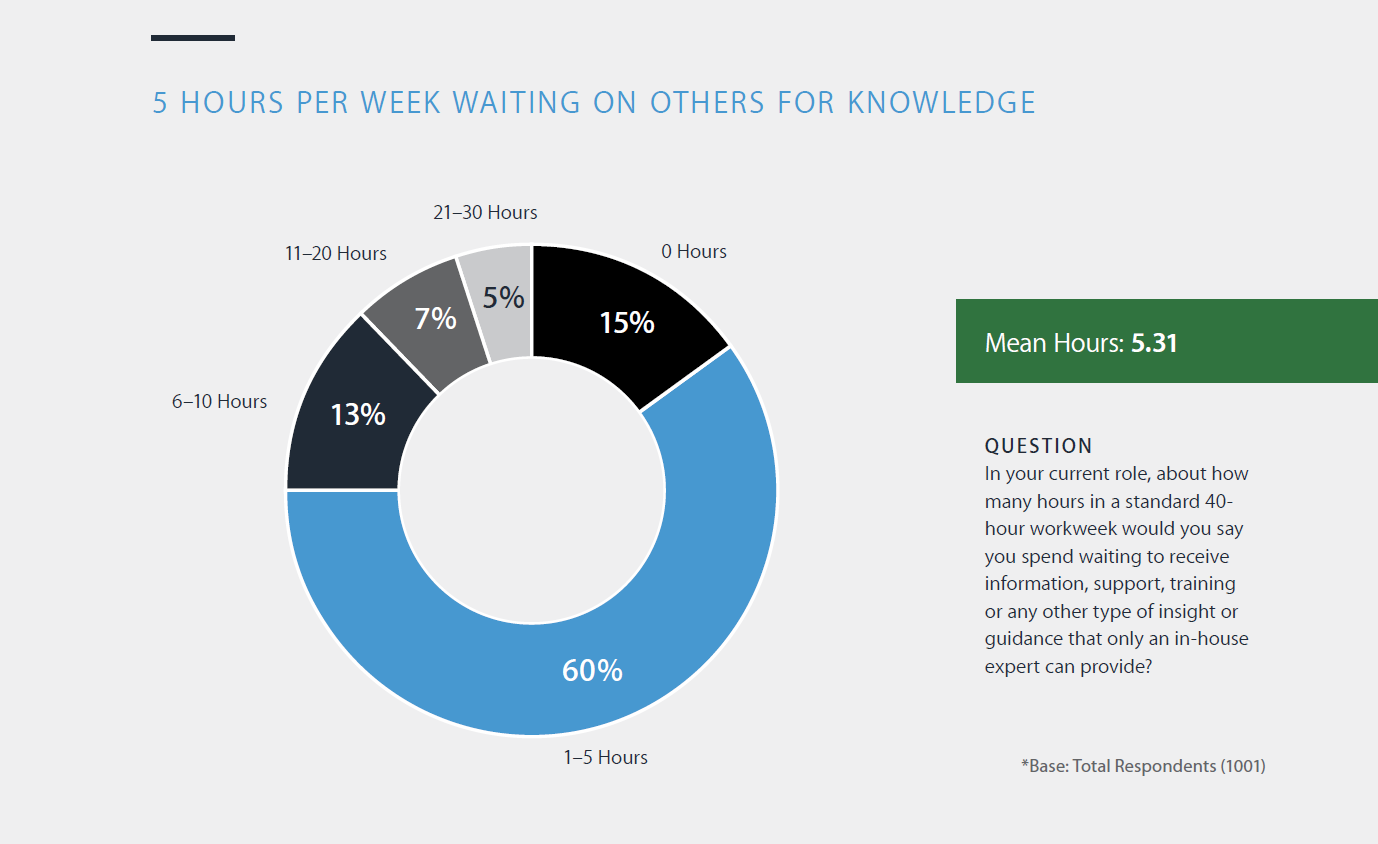
For example, say you want advice on how to structure a presentation for a client. You’ve seen multiple examples, and each one is structured differently. You send an email to your coworker Mandy, who knows the client better than anyone and can tell you the best way to approach your presentation. But Mandy is in meetings all day and doesn’t write back. You send a follow-up email the next morning, and later in the afternoon, she’s finally able to get back to you with the advice you need.
While waiting for Mandy’s response, you shifted your focus to other things. But your presentation was stuck at square one. You lost a day or two of potential progress, and now you have to cram to get it all done by the deadline.
2. Searching For Knowledge Inefficiently
Rather than lose time while they wait to hear back from someone, employees may try to forge ahead on their own. But doing so is often very inefficient: roaming online for information, second-guessing their decisions and essentially grasping at straws.
It’s almost like they’re new employees again. Their own experience can’t see them through in this situation. And the person with the right experience isn’t around to fill the gap. In our survey, employees reported spending 8 hours — a full day’s work — in this mode every week.
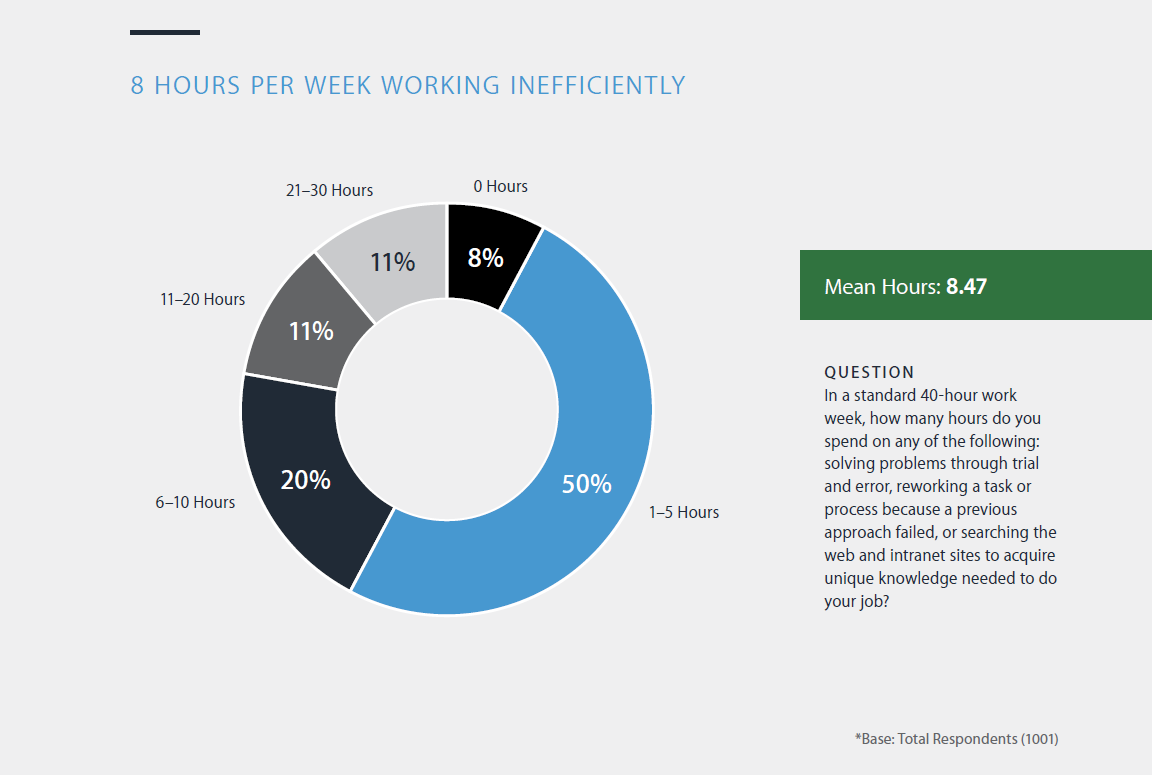
It’s true that trial and error can be educational. You often come out the other end with new knowledge that helps you out next time the situation arises. But the fact remains there are more efficient ways to acquire the same knowledge. It takes a lot less than 8 hours to watch a tutorial video or access another form of knowledge that the company has invested in preserving.
3. Duplicating Efforts
A third source of inefficiency comes when an employee knowingly or unknowingly does work that someone else has already done or is currently doing. On average, employees reported spending nearly 6 hours each week “reinventing the wheel” and duplicating other people’s work. Almost 1 in 3 say they spend more than 6 redundant hours every week. For 14 percent, duplicative work takes up a minimum of 10 hours.
Duplication can happen for a few reasons. Maybe the coworker who has already done the work isn’t immediately available to provide an answer or point you to the right resources. Or maybe you’re simply unaware that your effort is duplicative, and you unwittingly invest time and energy into coming up with a solution that someone else has already gone to the trouble to find.
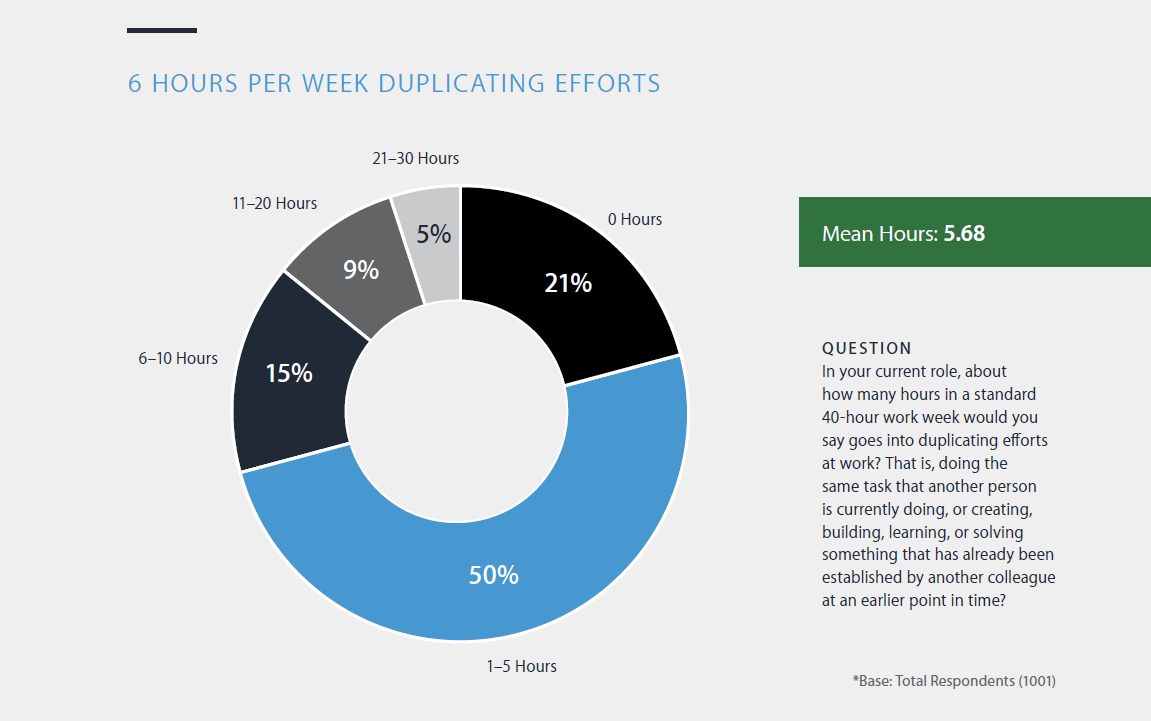
What are the most common reasons for duplicating existing work?
About a third of employees we surveyed reinvent the work of others knowingly and intentionally, so they can try or learn something new.
But for more than 70 percent of employees, duplication occurs because either people can’t reach the other person doing the same work, or because they have no idea someone else is doing it in the first place.
In part, this is an issue of time. Twenty percent of workers reported duplicating the work of others only because they’d been unable to reach the colleague in question. If that colleague’s insights had been more conveniently available, there would have been no reason to seek out the information independently.
Most often, however, the reason employees duplicate existing work is a simple lack of awareness that the work is already underway or complete. Time is a factor here as well — when project deadlines loom, employees will seldom spend much time investigating whether potential solutions already exist. The challenge to organizations, then, is to ensure that when relevant knowledge is available, other workers can find it quickly before they try to solve a problem themselves.
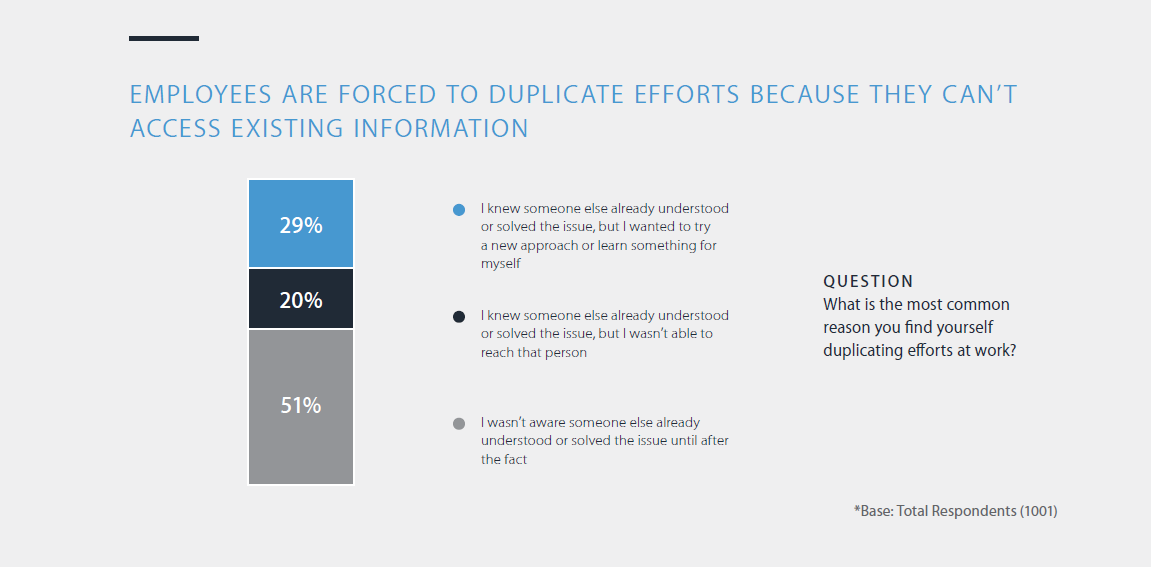
Employees Value Knowledge Preservation
Up to this point, our picture of unique knowledge and efficiency in the workplace has been built largely on time and proportions, such as how much time workers spend on certain tasks and how different sources and types of knowledge compare with one another.
But we also asked respondents about their views and attitudes on unique knowledge. How do employees feel about knowledge loss and knowledge sharing?

Overall, employees agreed with a number of statements that support the notion that knowledge gained through experience is exceptionally valuable, and that turnover negatively impacts the company’s knowledge resources — costing the company both time and money.
We also uncovered strong sentiments about the way that organizations manage knowledge. 63 percent of employees report that they would prefer to work for organizations in which unique knowledge is preserved. A similar proportion feels that organizations that fail to support a culture of knowledge sharing are making a mistake.
For employers, the big question stemming from our assessment of employee attitudes is “What do we do about it?”
The answer, according to our survey: find ways to capture and share what your people know.
If there’s one takeaway for employers, it’s that the people who work for them want more and better means of preserving unique knowledge so that it might still be accessible even after employees leave the company.
Of the 1001 employees in our survey, only 3 percent think preserving knowledge isn’t important. At 85 percent, a huge majority thinks it is.
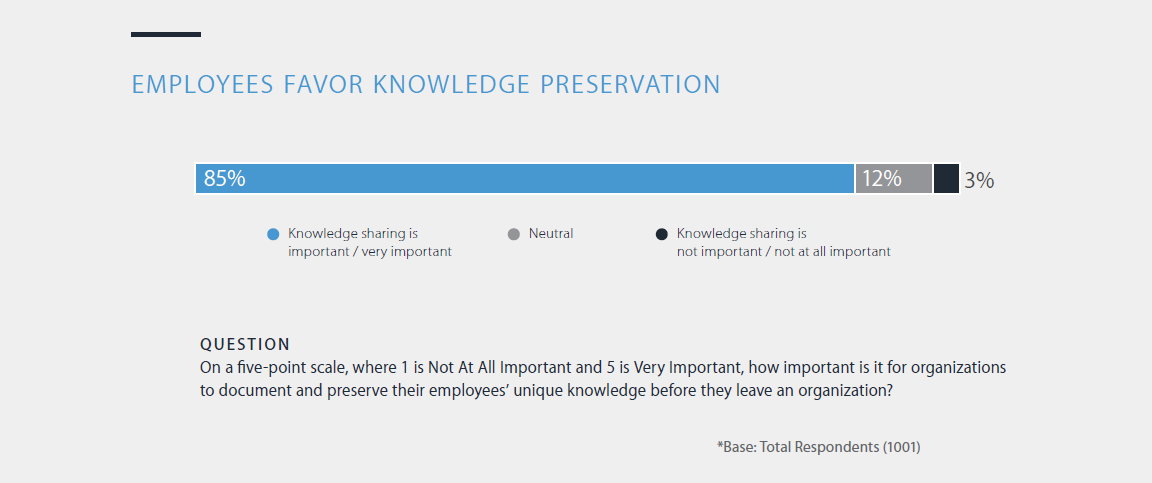
It comes as no surprise that employees who have had to wait or struggle to get the information they need are the most likely to be in favor of knowledge sharing. Perhaps more unexpectedly, however, employees who haven’t been personally inconvenienced aren’t far behind: 80 percent of employees who find information easy to access inside their organizations still feel strongly about the importance of knowledge sharing. The same is true for 77 percent of employees who haven’t personally faced delays.
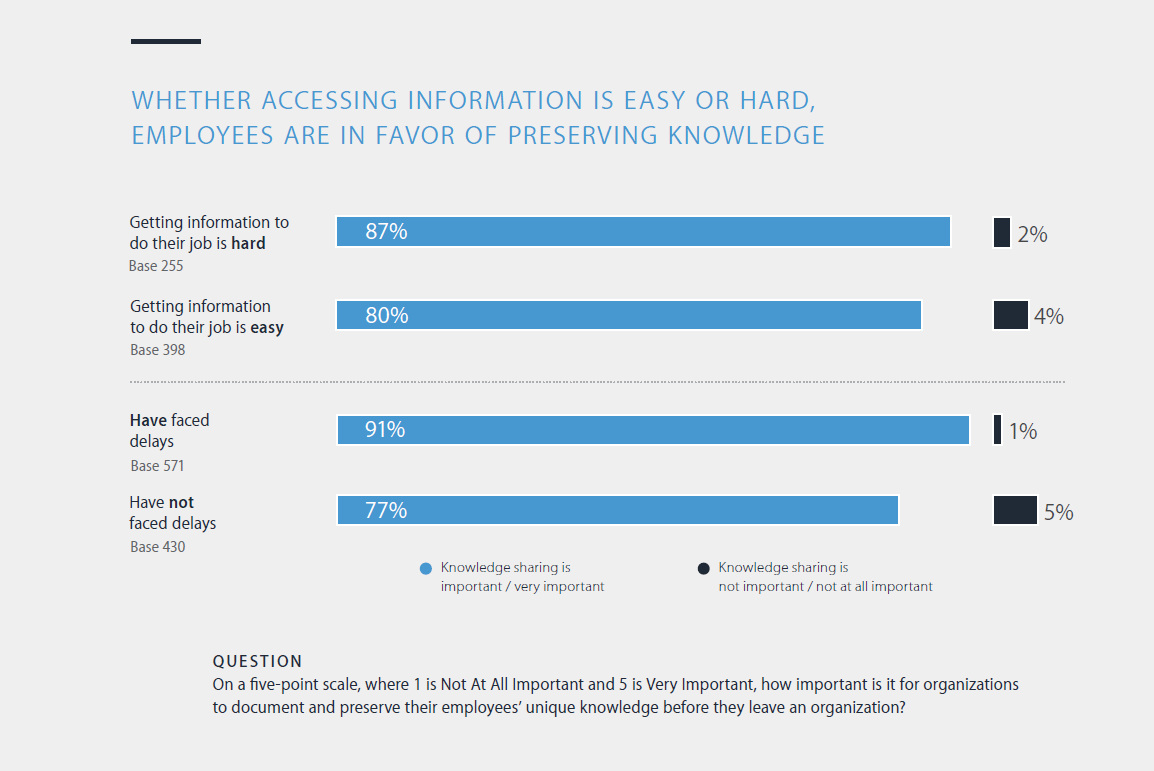
What this means is that employees see knowledge sharing as more than a way to resolve common pain points. They see it as a good idea in general. And if they ever have been personally inconvenienced, they’re even more convinced.
Employers, therefore, shouldn’t wait for their workforce to be frustrated before they look into better ways of sharing knowledge. Odds are their employees are ready for it right now.
How Much Is Unshared Knowledge Costing You?
Unshared knowledge holds employees back in their day-to-day work, making them less productive than they could be, little by little. They wait for information. They struggle to make progress without it. And they duplicate the efforts of other employees. All of these inefficiencies across your entire workforce add up to big losses for your company.
To date, the frustrations caused by poor knowledge sharing have gone overlooked largely because they’ve been difficult to quantify. Now, with real data showing the amount of time the average employee loses looking and waiting for knowledge, we can assign a real cost to unshared knowledge.



